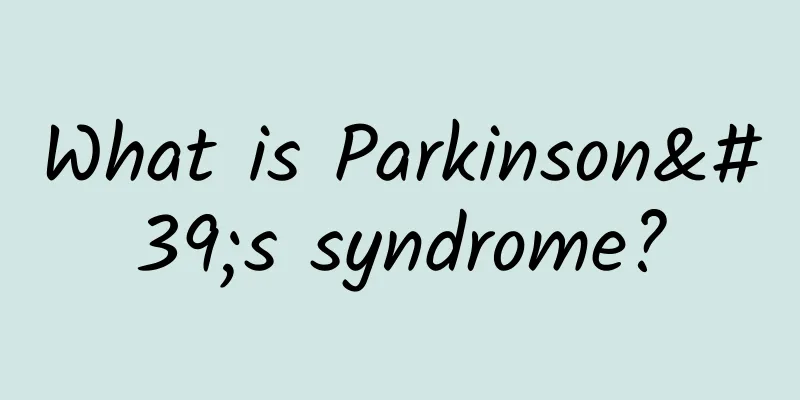What is Parkinson's syndrome?

|
Parkinson's syndrome mostly occurs in middle-aged people, that is, people around 50 years old. Generally, there may be symptoms of dizziness or unsteady standing at the beginning, but the onset of the disease is relatively short, so it will not be too obvious. As the disease worsens, the patient's body may tilt, shake all over, and become unable to take care of themselves. Parkinson's disease is a degenerative disease of the substantia nigra and nigrostriatal pathway that occurs in middle-aged and older adults. The American APDA calls those who develop the disease before the age of 40 young Parkinson's patients. The cause of essential parkinsonian paralysis is not yet clear. About 10% of patients have a family history. Some patients may develop Parkinson's syndrome due to encephalitis, cerebral arteriosclerosis, brain trauma, hypoparathyroidism, carbon monoxide, manganese, mercury, cyanide, reserpine, phenothiazine drug poisoning and antidepressants (such as methylamine oxidase inhibitors), which can cause Parkinson's syndrome with Parkinson's disease-like manifestations. [Edit this paragraph] Clinical manifestations: The disease has a slow onset and progressive worsening, with the following manifestations: (1) Posture and gait: The face is stiff, like a mask; the head is tilted forward, the trunk is bent forward, and the elbows and knees are slightly bent; the walking steps are small, starting slowly and then getting faster and faster, with a panic gait, and the upper limbs do not swing back and forth. (2) Tremors are common in the head and limbs, and are most obvious in the hands. The fingers show coarse rhythmic tremors (pill-rolling-like movements). In the early stages, tremors often occur when the patient is at rest, disappear during voluntary movements and sleep, and worsen when the patient is emotionally excited. In the late stages, tremors may become persistent. (3) Muscle stiffness: The tension of both the extensor and flexor muscles increases, and there is a gear-like or lead-pipe-like resistance during passive movement, which are called gear-like stiffness or lead-pipe stiffness, respectively. (4) Movement disorders are related to muscle stiffness. For example, stiffness of the articulatory muscles causes difficulty in pronunciation, and stiffness of the finger muscles makes it impossible to take care of oneself in daily life (such as difficulty in daily life, washing, eating, etc.). (5) Other symptoms include irritability and occasional impulsive behaviors; increased secretion of sweat, saliva, and sebaceous gland fluid; and decreased levels of dopamine and its metabolites in cerebrospinal fluid and urine. |
>>: Is foot soaking effective for gout?
Recommend
What is the cause of morning sickness and vomiting yellow water?
The main reason why pregnant women vomit yellow w...
A woman with this characteristic will never be able to have children in her lifetime
A woman's fertility can actually be seen from...
Sequelae of brain injury
Injury to any part of the body can cause a series...
What causes breast muscle pain?
Most female friends will feel pain in the breast ...
What is the cause of pain on the edge of the tongue? How to treat it
The symptom of pain on the edge of the tongue wil...
The difference between color blindness and color weakness
Color blindness and color weakness are relatively...
What to do if you have ovarian cysts during pregnancy
When pregnant, women must pay attention to their ...
What to do if you always want to masturbate
Nowadays, there may be a lot of topics about mast...
Watery vaginal discharge
The symptom of watery vaginal discharge in girls ...
Causes of armpit warts
What causes armpit warts? Many people may not kno...
How much is Lingzhi powder per pound?
The main ingredients of Ganoderma lucidum powder ...
There is a ball of flesh in the eye
For a normal person, eyes are the main organ for ...
What causes swelling around the eyes?
We all know that swelling around the eyes is a di...
The efficacy and function of Omeprazole enteric-coated capsules
Omeprazole enteric-coated capsules are mainly use...
How to treat hernia in children? Two methods are most effective
When a child suffers from hernia, parents should ...









